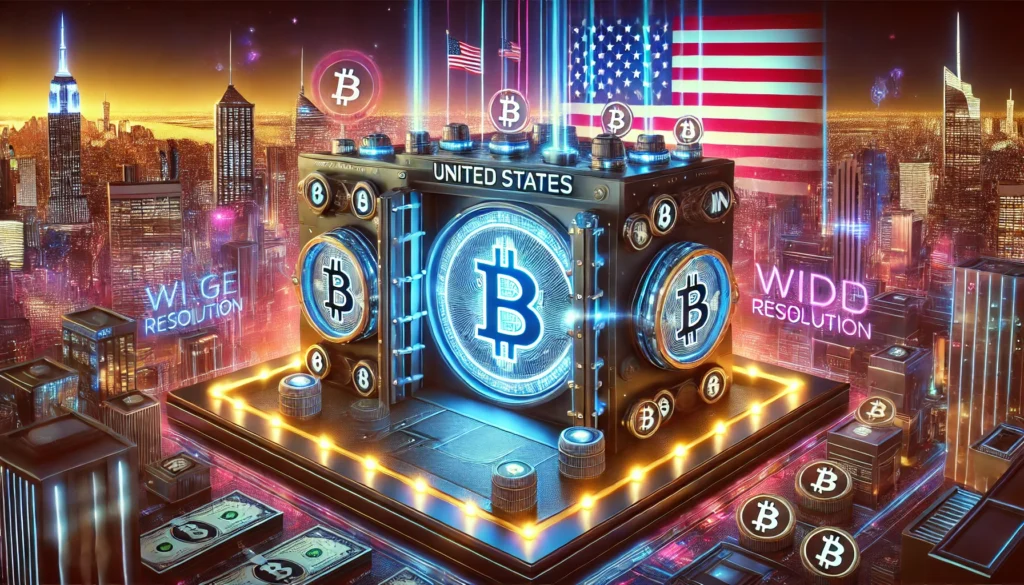The cryptocurrency world is abuzz with President Donald Trump’s recent proposal to establish a U.S. strategic Bitcoin reserve, an idea that could dramatically reshape the nation’s financial future. This groundbreaking initiative has sparked intense discussions among financial experts, Bitcoin enthusiasts, and government officials. Could this be the move that cements Bitcoin’s role as “digital gold” in global finance?
In an exclusive interview, David Bailey, CEO of BTC Inc. and organizer of the world’s largest Bitcoin conference, shared his perspective on the potential implications of this ambitious proposal. The conversation delved into the interplay between the Federal Reserve, the U.S. Treasury, and the burgeoning cryptocurrency market.
Trump’s Vision for a Strategic Bitcoin Reserve
President Trump’s proposal positions Bitcoin as a key strategic asset in the digital age, akin to how physical gold has been a cornerstone of national reserves for centuries. By creating a “digital Fort Knox”, the United States could establish a strong foothold in the global cryptocurrency ecosystem.
According to Bailey, this bold initiative aligns with the Treasury’s mandate to manage the nation’s financial stability and security. “The president has the authority to issue an executive order to create a Bitcoin reserve,” Bailey explained. “This move could empower the Treasury to reclaim financial dominance and reduce dependence on the Federal Reserve.”
Federal Reserve Chair Powell’s Resistance to Bitcoin
Federal Reserve Chair Jerome Powell’s public comments on Trump’s proposal have revealed skepticism toward Bitcoin’s role in national reserves. During a recent press briefing, Powell emphasized that the Fed is not inclined to embrace Bitcoin, sparking a sell-off in the cryptocurrency market.
Bailey, however, argued that Powell’s resistance may be rooted in frustration rather than genuine opposition. “The global monetary system is his domain, and Bitcoin represents a disruptive force,” Bailey noted. “Calling Bitcoin ‘digital gold’ was a subtle acknowledgment of its significance, even if he downplays its potential.”
Implications for the U.S. Treasury and Financial System
The establishment of a U.S. Bitcoin reserve could redefine the financial landscape by shifting power dynamics between the Federal Reserve and the Treasury. Analysts suggest this move would allow the Treasury to diversify its reserves, safeguarding against inflation and the volatility of traditional fiat currencies.
Bailey emphasized the strategic advantages of integrating Bitcoin into national reserves:
- Economic Security: A Bitcoin reserve could act as a hedge against currency devaluation.
- Global Leadership: By adopting Bitcoin, the U.S. could lead the charge in digital asset innovation, setting a precedent for other nations.
- Market Stability: Establishing a government-backed reserve could reduce market volatility and instill confidence among investors.
Market Reactions: A Bitcoin Price Surge?
The prospect of a U.S. Bitcoin reserve has fueled widespread speculation about its impact on cryptocurrency prices. Fundstrat’s Sean Farrell predicted that such a move could drive Bitcoin prices to $500,000, an unprecedented surge that would solidify its status as a premier store of value.
Investors and market watchers are closely monitoring developments, anticipating that this proposal, even if not immediately implemented, could create lasting ripples in the global financial markets.
Why Bitcoin is the “Digital Gold” of the Future

Bitcoin’s comparison to gold is more than symbolic—it reflects its intrinsic qualities as a scarce, decentralized, and globally recognized store of value. Just as nations stockpile gold to bolster their economic security, Bitcoin offers similar benefits for the digital age:
- Decentralization: Unlike traditional currencies, Bitcoin is immune to government manipulation or overprinting.
- Scarcity: With only 21 million Bitcoin ever to exist, its fixed supply mirrors gold’s limited availability.
- Portability: Bitcoin’s digital nature makes it far easier to transfer and store than physical gold.
Bailey argued that embracing Bitcoin is a natural evolution for national reserves. “If physical gold was the asset of choice in the industrial age, Bitcoin is the logical equivalent in the digital age,” he stated.
Policy Challenges and Future Prospects
Despite the enthusiasm surrounding Trump’s proposal, significant hurdles remain. The integration of Bitcoin into government reserves would require:
- Legislative Support: Congressional approval or executive action to authorize the move.
- Infrastructure Development: Establishing secure storage and transaction systems for Bitcoin.
- International Cooperation: Coordinating with other nations to maintain balance in the global cryptocurrency market.
Bailey remains optimistic, suggesting that even if full implementation takes time, the proposal itself is a victory for Bitcoin’s legitimacy. “This conversation elevates Bitcoin to the level of serious national policy discussions,” he remarked.
A New Era for National Reserves
As the U.S. contemplates the integration of Bitcoin into its financial strategy, the implications are profound. A strategic Bitcoin reserve could enhance economic resilience, reinforce the nation’s global leadership, and usher in a new era of financial innovation.
The idea of a digital reserve transcends party lines, presenting an opportunity for bipartisan collaboration on one of the most pressing economic issues of our time. Whether or not Trump’s proposal becomes reality, it has undeniably advanced the narrative of Bitcoin as a transformative force in modern finance.
